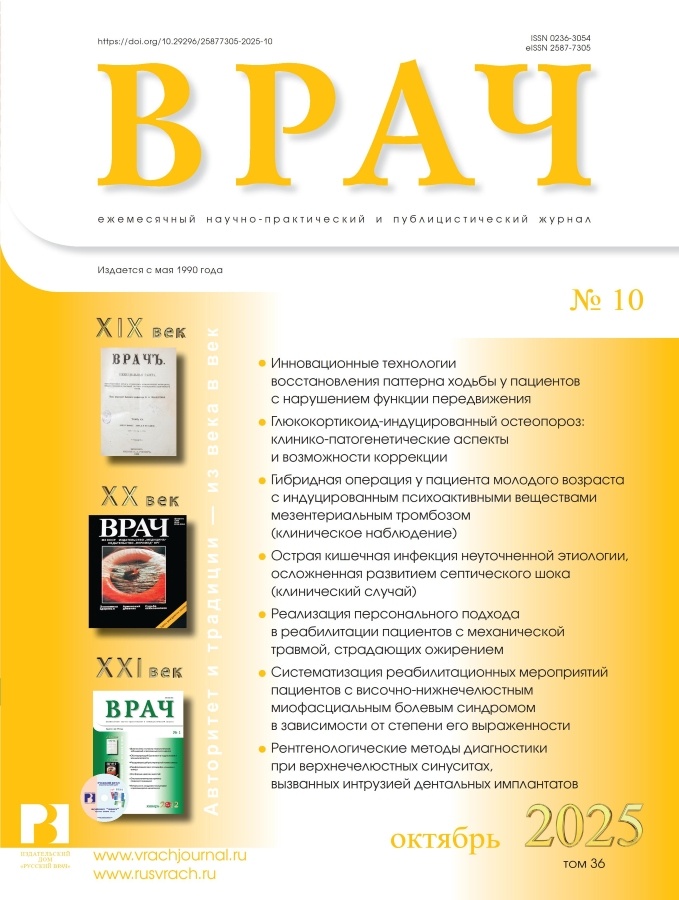Systematization of rehabilitation measures for patients with temporomandibular myofascial pain syndrome, depending on its severity
- Authors: Shkarin V.V.1, Yarygina E.N.1, Makedonova Y.A.1, Emelyanova O.S.1, Yazykova E.V.1
-
Affiliations:
- Volgograd State Medical University, Ministry of Health of Russia
- Issue: Vol 36, No 10 (2025)
- Pages: 64-69
- Section: From Practice
- URL: https://journals.eco-vector.com/0236-3054/article/view/696308
- DOI: https://doi.org/10.29296/25877305-2025-10-13
- ID: 696308
Cite item
Abstract
Objective. To systematize rehabilitation measures for patients with temporomandibular myofascial pain syndrome of mild, moderate and high severity.
Materials and methods. A survey of 86 people was conducted, randomized into 3 groups depending on the severity of temporomandibular myofascial pain syndrome. A clinical and electromyographic examination of the condition of the chewing muscles was performed during 3 months of follow-up against the background of active rehabilitation measures.
Results. It has been proved that for patients with temporomandibular myofascial pain syndrome of mild severity, it is sufficient to perform a complex of hardware myohymnastics, with moderate and high severity, the number and effectiveness of measures should be increased, since only the performance of isokinetic exercises is not effective enough. During the dispensary observation and analysis of the clinical situation, it is possible to switch from one dispensary group to another.
Conclusion. The clinician should remember that small episodes of soreness cannot be the basis for therapy, in some cases, observation is indicated. When the disease is regressed during a follow-up examination, the symptoms are often less pronounced. The appointment of treatment may be an example of overdiagnosis and the cause of a false positive result with various methods of influencing the functional activity of the chewing muscles.
Full Text
About the authors
V. V. Shkarin
Volgograd State Medical University, Ministry of Health of Russia
Author for correspondence.
Email: mihai-m@yandex.ru
ORCID iD: 0000-0002-7520-7781
SPIN-code: 7560-1787
Professor, MD
Russian Federation, VolgogradE. N. Yarygina
Volgograd State Medical University, Ministry of Health of Russia
Email: mihai-m@yandex.ru
ORCID iD: 0000-0002-8478-9648
SPIN-code: 6284-9402
Associate Professor, MD
Russian Federation, VolgogradY. A. Makedonova
Volgograd State Medical University, Ministry of Health of Russia
Email: mihai-m@yandex.ru
ORCID iD: 0000-0002-5546-8570
SPIN-code: 4573-5040
Professor, MD
Russian Federation, VolgogradO. S. Emelyanova
Volgograd State Medical University, Ministry of Health of Russia
Email: mihai-m@yandex.ru
ORCID iD: 0000-0001-8772-7971
SPIN-code: 3604-6896
Associate Professor, Candidate of Medical Sciences
Russian Federation, VolgogradE. V. Yazykova
Volgograd State Medical University, Ministry of Health of Russia
Email: mihai-m@yandex.ru
ORCID iD: 0009-0001-3591-7949
SPIN-code: 4062-8576
Russian Federation, Volgograd
References
- Девликамова Ф.И., Хабиров Ф.А. Миофасциальный болевой синдром: практическое развитие теоретических оснований. Российский журнал боли. 2020; 18 (3); 39–47 [Devlikamova F.I., Khabirov F.A. Myofascial pain syndrome: practical development of theoretical foundations. Russian Journal of Pain. 2020; 18 (3): 39–47 (in Russ.)]. doi: 10.17116/pain20201803139
- Сойхер С.М. Кудряшова В.А., Оганесян М.В. и др. Дисфункции жевательных мышц: анатомические основы в этиопатогенезе. В кн.: Есауленко И.Э. (ред.). Морфология – науке и практической медицине: сб. науч. тр., посвящ. 100-летию ВГМУ им. Н.Н. Бурденко. Воронеж: Научная книга, 2018; с. 331–6 [Soyer S.M., Kudryashova V.A., Oganesyan M.V. et al. Chewing muscle dysfunction: anatomical basics in etiopathogenesis. In: Esaulenko I.E. (ed.). Morphology to science and practical medicine conference. Voronezh: Nauchnaya kniga, 2018; pp. 331–6 (in Russ.)].
- Osiewicz M., Lobbezoo F., Ciapała B. et al. Pain Predictors in a Population of Temporomandibular Disorders Patients. J Clin Med. 2020; 9: 452. doi: 10.3390/jcm9020452
- Македонова Ю.А., Ярыгина Е.Н., Вейсгейм Л.Д. и др. Современные подходы к купированию миофасциального болевого синдрома жевательной мускулатуры. Cathedra. Стоматологическое образование. 2024; 87 (1): 18–24 [Makedonova Yu.A., Yarygina E.N., Weisgeim L.D. et al. Modern approaches to the relief of myofascial pain syndrome of the masticatory muscles. Cathedra. Dental education. 2024; 87 (1): 18–24 (in Russ.)]
- Фергюсон Л.У., Гервин Р. Лечение миофасциальной боли. Клиническое руководство. Пер. с англ. Под общ. ред. Цыкунова М.Б., Еремушкина М.А. 2-е изд. М.: МЕДпресс-информ, 2019 [Fergyuson L.U., Gervin R. Lechenie miofastsial'noi boli. Klinicheskoe rukovodstvo. Transl. from Engl. Ed. By Tsykunov M.B., Eremushkin M.A. 2-e izd. M.: MEDpress-inform, 2019 (in Russ.)]
- Дубова Л.В., Китаева Т.В., Маджидова Е.Р. и др. Анализ показателей поверхностной электромиографии у пациентов с дисфункцией височно-нижнечелюстного сустава. Мат-лы 20-го Всеросс. стоматол. форума, 7–9 февраля 2023 г. Москва, Россия. Российская стоматология. 2023; 16 (2): 51–83 [Dubova L.V., Kitayeva T.V., Majidova E.R. et al. Analysis of surface electromyography indicators in patients with temporomandibular joint dysfunction. Materials of the 20th All-Russian Dental Forum 2023, Moscow, Russia. Russian Journal of Stomatology. 2023; 16 (2): 51–83 (in Russ.)]. doi: 10.17116/rosstomat20231602151
- Szyszka-Sommerfeld L., Machoy M., Lipski M. et al. The diagnostic value of electromyography in identifying patients with pain-related temporomandibular disorders. Front Neurol. 2019; 10: 180. doi: 10.3389/fneur.2019.00180
- Македонова Ю.А., Ярыгина Е.Н., Александров А.В. и др. Градация степени выраженности гипертонуса жевательной мускулатуры. Эндодонтия Today. 2024; 22 (1): 80–5 [Makedonova Yu.A., Iarygina E.N., Alexandrov A.V. et al. Gradation of the severity of hypertonicity of the masticatory muscles. Endodontics Today. 2024; 22 (1): 80–5 (in Russ.)]. doi: 10.36377/ET-0006
- Македонова Ю.А., Воробьев А.А., Павлова-Адамович А.Г. и др. Критериальная оценка степени выраженности гипертонуса жевательной мускулатуры у детей с ДЦП. Стоматология детского возраста и профилактика. 2023; 23 (2): 92–103 [Makedonova Yu.A., Vorobyov A.A., Pavlova-Adamovich A.G. et al. Criteria-based assessment of the severity of hypertonicity of the masticatory muscles in children with cerebral palsy. Pediatric dentistry and prevention. 2023; 23 (2): 92–103 (in Russ.)] doi: 10.33925/1683-3031-2023-643
Supplementary files












